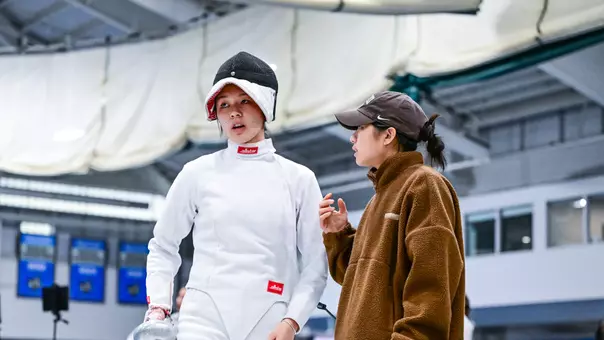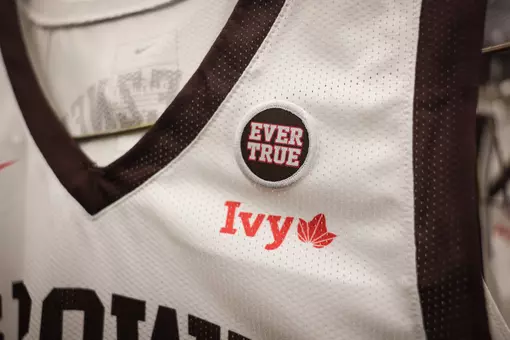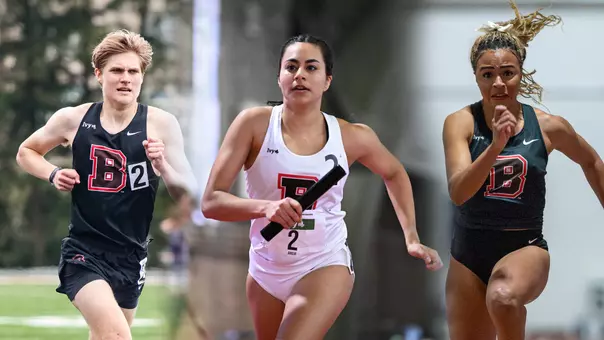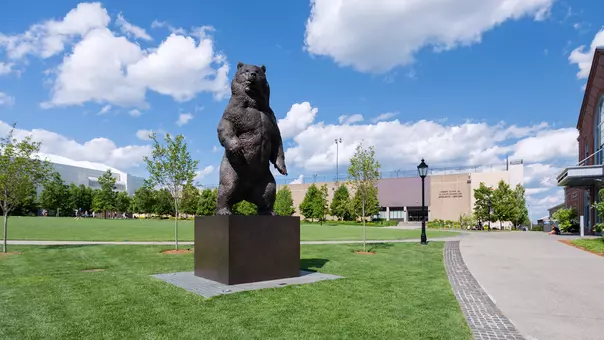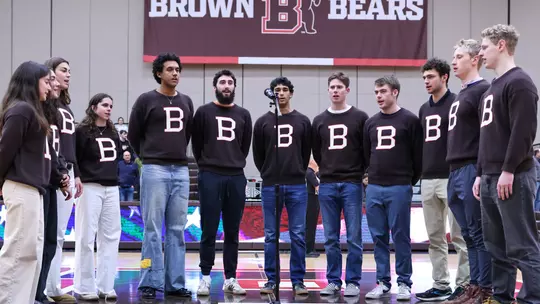
From Scoreboards to Scores: Meet Brown’s All-Student-Athlete A Cappella Club
5/15/2025
by: Linus Lawrence '25
The Pizzitola Sports Center crowd grew quiet on February 14 as twelve Brown student-athletes gathered at center court.
The men’s basketball team loomed in the background, poised for a pivotal Ivy match against Princeton — but these student-athletes had a different type of task ahead. Their uniform was a sweater embroidered with the letter “B,” their equipment was a single microphone, and the only score they had in mind was sheet music.
This is Jockapella: Brown’s all-student-athlete a cappella club.
“We take ourselves so seriously a lot of the time with our sport, when we’re training and we’re competing,” said Sara Perez ’26 of the Women’s Track & Field team. “Jockapella is like, you don’t have to take yourself so seriously, but you still come out with a product that you’re proud of, and everyone really enjoys it.”
“There’s so much wonderful experience at Brown,” said Simon Hatcher ’24 of the Men’s Crew team, and Jockapella is “like sprinkles on top, the cherry on top. A little bit of extra enjoyment, a little bit of extra fun, a little bit of extra camaraderie.”
Jockapella meets for rehearsals once a week on Sundays in Friedman Hall, where they do vocal warm-ups, learn songs in sections, and run their repertoire — including the National Anthem, which they’ve now performed at multiple Brown Athletics events.
Hatcher attended his first Jockapella meeting in early 2020 after news reached him about an a cappella group for varsity athletes. “As someone who did, you know, good-not-great singing when I was in high school, I thought it was a nice compliment to academics and a nice compliment to athletics as well,” he recalled. “So I thought I might as well give it a try.”
At the time, the group’s arrangements were provided by faculty advisor Thano Chaltas ’87 P’24. The engineering professor and former member of The Jabberwocks helped restart Jockapella in 2019 after seeing them as a student in the eighties.
“When I came back and started teaching, I didn’t see any Jockapella anywhere,” Chaltas recalled. When he told interested student-athletes in his class that such a group used to exist, they resolved to begin anew.
“I’m an a cappella nerd,” Chaltas explained, “and I recognized the challenges that athletes have in being able to participate in a cappella on campus. Rehearsals are a bit too fixed and rigid for people who are traveling, concerts happen most of the time on weekends,” and groups tend to practice close to midnight, which “does not work if you’re waking up at six in the morning.”
Chaltas delivered SATB (Soprano-Alto-Tenor-Bass) arrangements of songs he thought were “interesting and easy,” like “Valerie” and “My Girl,” by recording learning files of himself singing in GarageBand.
“We would go show up in some empty classroom somewhere and listen to Thano sing these four parts on GarageBand, and try to learn them,” Hatcher explained of the early Jockapella rehearsals.
Jockapella’s resurrection was paused due to COVID, but in mid-2022, Casey Chan ’23 of the Fencing team reached out to Hatcher to resume rehearsals.
“We put together a sizable contingent,” Hatcher recalled. “Probably 10 core members, 15 additional people who would pick and choose when they wanted to show up.”
Unlike their varsity teams and other a cappella groups on campus, Jockapella turns no potential singer away. As Hatcher put it in sporting terms, “there are absolutely no cuts.”
This openness results in a laid-back commitment level, as well as members with a wide range of experience.
“We have people who have zero experience, who’ve never seen sheet music in their life, never done any sort of performing before, but then we also have a couple people in our group right now who have done a cappella in high school,” said current Jockapella head Connor Prior ’25 of the Men’s Crew team.
Prior himself wasn’t a particularly experienced singer before showing up to his first rehearsal in fall 2022. “I did some school plays when I was in elementary school, a little bit in middle school, but I hadn’t really done anything like that since then,” Prior said. “I’d never say I really had a passion for singing or anything. I don’t think I’m any good at it.”
“We’ve had some very talented singers in our group, like classically trained opera singers,” Hatcher said, as well as “people who are total newbies, and they were kind of just there for fun. So it’s an interesting challenge navigating those highly disparate skill levels.”
For student-athletes with musical experience, Jockapella creates a space for them to continue singing without unnecessary scheduling stress. In fact, Jockapella can even serve as a refreshing break at the end of a tiring weekend.
“Sometimes I go just to take my mind off all my assignments and stress that I have,” said Perez, who played guitar and piano when she was younger. “We’ll work on the songs, but we’ll also do karaoke. We’ll just kind of talk and laugh with each other. So it’s a cappella and we definitely are serious about trying to sound good, but at the same time we understand the time constraints that everyone is under and we’re using it also as a way to just relax a little bit.”
“A lot of athletes are trying to catch up on schoolwork on Sundays. I’m in the library from probably 11:30 to 5:00, or something like that,” Prior said. “It’s just a nice little break in the day.”
“To have a structured hour of time where you’re with your friends, you’re doing something vaguely creative, vaguely stimulating and something where you’re really part of a collective — not just sitting on your phone to unwind, not just watching TV to unwind — I think that was really meaningful for me,” Hatcher said.
Jockapella also provides an opportunity for student-athletes, often insulated socially within their own sport, to become part of a larger community and meet friends on other teams.
“I’m on the crew team, and we practice at the boathouse,” Prior said. “We’re never really around other athletes a lot of the time. This is a different opportunity.”
“It’s not even like the people in my class or my closest friends are in Jockapella,” Prior elaborated, “but people in other grades who I wouldn’t know as well otherwise unless they did it, and now I have better relationships with them because they’re doing it with me.”
Hatcher pointed to the group’s post-rehearsal routine of walking from the Main Green to the Ratty and eating dinner together as an example of this bond.
“Typically, the sports teams will all sit at their different tables and create their own cliques, and that was particularly symbolic of the division between teams,” Hatcher said. “That would break down a little bit following Jockapella. The hockey guys would join the crew table, or there would be a good mix of track people and rowers and fencers at the Ratty.”
The breakdown of team divisions is also represented by the group’s performance attire — the iconic letter sweaters which are given to all Brown athletes after their freshman year.
“It’s a really cool tradition that Brown has,” Perez reflected, “and I’m always very proud when I get to wear it because I know that it represents all the hard work that we do.”
No matter their sport, all student-athletes specialize in being at their best when the lights are brightest — a trait which gives Prior confidence prior to one of Jockapella’s performances.
“They’ve dealt with the gametime nervousness before,” Prior said. “If they can do it in their own sport, which is what their pride is, then they can do it just for some Jockapella performance. So you get up there, and you know everyone’s locked in and they’re gonna perform just how they would on their own race day or game day…everyone’s gonna rise to the occasion.”
On April 27, Jockapella had their end-of-year performance under Wayland Arch, where Brown University’s sixteen other a cappella groups (according to the Brown Daily Herald in 2023, Brown has the most groups per capita of any college in the U.S.) frequently serenade students with the help of the space’s reverberant acoustics.
“It’s a lot of fun,” Prior said, calling the performance a culmination of the group’s work. “We’ve been having fun trying to practice and learn these songs throughout the year.”
The setlist consisted of three upbeat hits — “Stacy’s Mom,” “Shotgun,” and “Send My Love (To Your New Lover)” — with all the arrangements found by Prior on MuseScore.
“It’s just those songs that people like to listen to, they like to sing, they’re catchy,” Prior explained. “Those are the songs we usually look for.”
In the fall, the graduating Prior will be handing off leadership of Jockapella to Perez, just as Hatcher handed it to him. Chaltas had stressed to Hatcher the importance of ensuring future leadership is in place in order for the group to be self-sustaining — even if its culture, as with other a cappella groups, evolves.
“The great thing about Brown is that everything gets to change,” Chaltas said. “If I went to see the Harvard Krokodiloes or the Yale Whiffenpoofs, I could probably sit down and write five songs that’ll be on their set. That would never be the case for any Brown groups. We are not so tradition-laden that everything’s the same. Screw that. That’s no fun.”
But Jockapella won’t aim to stray from its core objective: giving student-athletes an outlet to have fun, connect, and make music.
“It’s only an hour on Sundays, but it definitely has brought a little more light into my college experience,” Perez said.
“It might not be the best a cappella you’re going to hear,” Prior said. “It’s basically taking all these singers from all different walks of life, who maybe have never had vocal talent — but you bring them all together, we practice all together, and it’s gonna become something that’s greater than the sum of its parts.”

